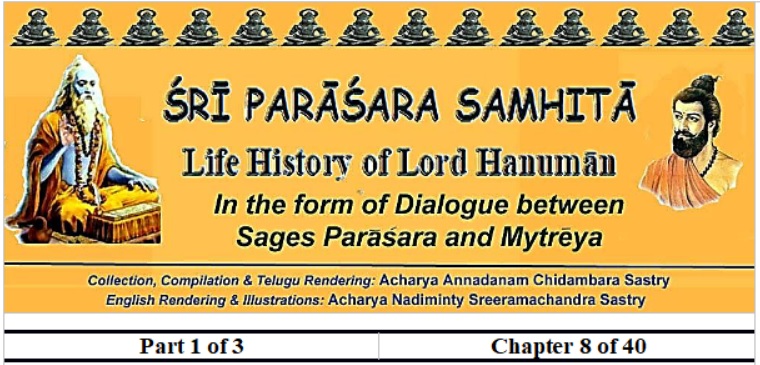

8th Chapter (Aşţama Paţalah)
The History of Dhwajadatta
(Dhwajadatta Caritam)
श्री मैत्रेय:
Mytrēya:
पराशर महाप्राज्ञ! हनुमन्मंत्रवैभवम्
भूयो पि श्रोतुमिच्छामि कृपया वद मे प्रभो!।। 1
“Oh! Sage Parāśara! I wish to hear the greatness of Hanumanmantra more. Hence kindly describe the same.
केन चादौ पुरा जप्तं-हनुमन्मंत्रमुत्तमम् ?
केनोपदिष्टं गुरुणा-कस्मै शिष्याय धीमते ? 2
This very best Hanumanmantra was earlier recited by whom firsrt? Which Guru imparted it to which pupil?
कस्य सिद्धिप्रदं शीघ्रं जप्तं विश्वासपूर्वकम्
विलंबितं फलं कस्य? तत्सर्वं प्रतिपाद्यताम्।। 3
Who recited with devotion and obtained attainment? Who obtained attainment late? Let me know the whole details,
श्रीपराशर:
Parāśara on Puşhkara
इतिहासं महापुण्यं श्रोतृणां सर्वकाम्यदम्
सर्वपापहरं नृणां नारीणां वा विशेषत:।। 4
Mytrēya! There is a very pious history that fulfills desires on hearing. That cleanses the sins of men and women.
सनत्कुमारवदनात् श्रुत्वेमं ब्रह्मसंसदि
यथाश्रुतं प्रवक्ष्यामि शृणुष्व मुनिसत्तम! ।। 5
I am telling you the same as heard by sage Sanatkumāra from the Creator Brahma. Oh! Seer! Listen.
पुरा कृतयुगे भूमौ-पुष्कराख्यो महामुनि:
सर्वशास्त्रार्थतत्त्वज्ञ: सर्वागमविशारद:।। 6
Once during the Kŗtayuga (first Age of the World), there lived on Earth a great seer named Puşhkara, who is adept in all sciences, natures and methods of worship.
शांतो दांतस्सदाचार: श्रद्धावाननसूयक: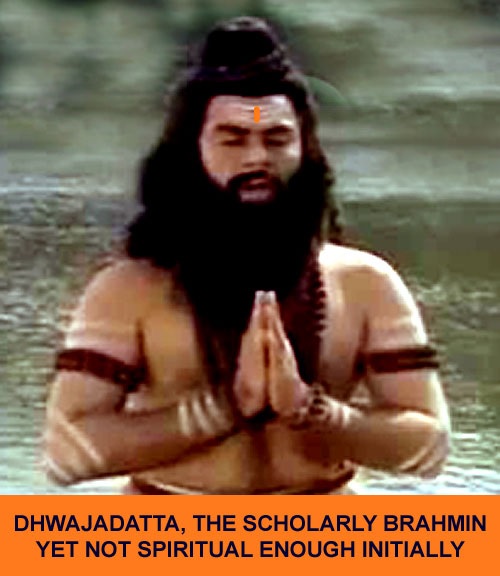
सर्ववेदार्थसारज्ञ: सदा मंत्रार्थतत्पर:।। 7
He has control of senses, was a stickler to ordained traditions and rules, having interest I learning, not having jelousy, knowing the meaning of Vedas and Veda based sciences and remains contemplating on mantras.
एवं सर्वगुणोपत: हनुमद्भभक्तिमान्मुनि:
कदाचिदात्मना जप्तुं हनुमन्मंत्रमुत्तमम्
नैमिषारण्यमाकीर्णं सर्वैर्मुनिगणैस्सदा
सिद्धाश्रममिति ज्ञात्वा सिद्धयोगी समाविशत्।। 8
Thus (Puşkara), possessor of all good virtues, and an ardent devotee of Hanuman went knowingly, along other sages to Siddhaśrama located in the Naimisa forest to perform recitations of Hanumanmantra.
तत्र गत्वा महायोगी पुष्कर: पुष्करेक्षण:
जजाप परमं जप्यं हनुमन्मंत्रमुत्तमम्।। 9
After going there that lotus petal eyed yogi Puşkara recited the best and worthy of recital Hanumanmantra.
सिद्धत्वान्मंत्रराजस्य फलव्यग्रो न चाभवत्
नापेक्षां कुरुते तस्मिन् सदा मंत्ररतो भवेत्।। 10
He remained equanimous without any worries. He was went on reciting the mantra without looking for its fruits.
अथास्मिन्नंतरे ब्रह्मन् ध्वजदत्ताह्य्यो द्विज:
वेदवेदांगसारज्ञ: दरिद्रो बहुपुत्रवान्।। 11
Dhwajadatta
Oh! Sage Mytrēya! At that moment came in a Brahmin named Dhwajadatta who was a Vedic scholar and had many children.
उपादानरतो नित्यं गृह्णाति सत्कुटुंबिन:
नालं क्षुधार्तये तस्य शिशूनां धान्यमर्जितम्।। 12
He was coming after obtaining grains as alms from householders and good people; but it was not sufficient to feed all his children.
शाकाहारेण तद्भार्या जीवनं कुरुते स्वकम्
शीलानाम सुशीला च महासाध्वी कुटुंबिनी।। 13
Dhwajadatta’s Wife Śeela
His wife named Śeela is is of righteous nature and an idel housewife. She lived solely on vegetables.
कदाचिदपि नो वेत्ति-ह्नान्नं वा सिद्धमात्रकम्
पातिव्रत्याद्विवेकाच्च सा नोपालभते पतिम्।। 14
She never ate a morsel of cooked rice. Yet she never criticized her husband’s poverty as she was a faithful wife and a wise person.
निजकर्मफलं नूनं भोत्तव्यमिति जानती
पतिं शुशूषमाणा सा न चकंपे क्षुधावती।। 15
As she knew that one has to bear the consequences of once past deeds, she involved herself in serving her husband, depite remaining perpetually hungry.
शोकमात्रेण सा साध्वी बहुकालं न्यनवाहयत्
न विवेद पतिस्तस्या: शाकाहारं कदाचन।। 16
That pious dignified lady has spent most of the time in sadness. Her husband never knew about her living on vegetables only.
अन्नं भुक्तावशिष्टं तु भोक्षतीत्येव मन्यते
सापि न पे्रेयसी प्राह नान्नं मे स्तीति भामिनी।। 17
Her husband always thought that she was eating food left by him. But his darling wife, best of women never mentioned that she had no rice to eat.
ध्वजदत्तो महाप्राज्ञ उपादानरतो पि सन्
अध्यापयन् बहून् विप्रान् तस्थौ सब्रह्राचारिभि:।। 18
That great scholar Dhwajadatta was teaching many people and spent valuable time with brāhmins, though he is always involved in collecting alms.
अथासीनो बहिर्वेद्यां परीक्षां कर्तुमुद्यत:।। 19
Afterwards he used to sit on the dias in front of his house and conduct examinations.
सामगान् कतिचिद्विप्रान्-याजुषान् बह्वृचानपि।।
अन्यानाथर्वणांश्चैव गान्धर्वानपि गारुडान्।।
हनुमद्वेदशिरसि निष्णातानपि वै द्विजान्
मांडूकानपि नानांश्च-तान् परीक्षितवान्द्विज:।। 20
He used to evaluate a variety of scholars, like those practicing Sāmavēda, Yajurvēda, Ŗgvēda, Atharwaņaēda, music (sangrrta), anti-poisin (gārudika) and other scriptures, as well as those that are experts in Hanumdvēda science and Māndukyōpanişad (one of the treatise on Veda).
आहूतवान्निजं पुत्रं ध्वजदत्त: परीक्षितुम्
आहूतो पि न निष्क्रांत: क्षुधार्तो मातृसन्निधे:।। 21
Dhwajadatta’s Realisation:
Dhwajadatta called his own sin for examination. Even on being sp called, his son did not leave his mother and cime due to hunger pangs.
क्षुधितापि महासाध्वी शाकाहारं स्वकं ददौ 22
Because she was an ideal house wife, the mother gave her vegetables to her son to eat, though she herself was hungry.
पुत्राय क्षुधितायाशु परीक्षा दीयतामिति
पुत्रे चिरायमाणे तु ध्वजदत्त उपागमत्।। 23
As the hungry son did not come right away, Dhwajadatts himself went there to cionduct the examination.
ददर्श भक्षमाणं तं-शाकं तन्मातृसन्निधौ
अथाब्रवीत्सपुत्रां तां-प्रेयसीं मितभाषिणीम्
त्वया किं भक्ष्यते साध्वि यतो नायाति पुत्त्रक:।। 24
He saw the boy eating leafy vegetable with his mother. Then he asked his dear less-talking, “Oh! Faithful wife! What are you eating? Why our son is not coming on calling?
स्ववृत्तदर्शनात्साध्वी लज्जिता च मुहुर्मुहु:
उच्चमानापि भत्र्रा सा नोत्तरं प्रतिपद्यते।। 25
That pious lady, out of shame that her truth has come out, could not give an answer for a little while.
विलंबासहमानस्सन्-शाकमात्रं तमस्पृशत्
अन्नाभावादिदं भुक्तं इति निर्विण्णमानस:।। 26
Dhwajadatta’s Repentence:
Not able to bear the delay he (Dhwajadatta) caught hold of the vessel containing leafy vegetable. Surprised to know that they are eating leaves as there is no food, he felt vey sorry.
निनिंदात्मानमक्रुद्ध: धिग्जीवनमिदं मम
श्रुतं धिड्मे खिलं शास्त्रं धिगाचारमितीरयन्
यतस्साध्वी महाप्राज्ञी शाकाहारेण जीवति।। 27
Feeling that the reason for his scholarly faithful wife taking leafy meals is a reflection on his own inability, he cursed himself that his life, knowledge of all the scriptures and sciences, tradition and other things are just useless,
अथोवाच प्रियां विप्र: दययाविष्टचेतन:
दु:खगदगदया वाचा-प्रेयसीदैन्यदर्शनात्।। 28
And overcome by compassion, feeling sorry for the pitiable condition of his dear one, with a trembling voice, he said so to her.
यत्र कुत्राप्यटन् भार्ये! त्वन्मुखांभोजदर्शनात्
विस्मृत्याध्वपरिश्रांतिं सद्योनिर्वृतिमाप्नुयाम्।। 29
“Oh! Wife dear! How much I may wander, I get relieved of all the tiredness by jus the glimpse of your lotus like face and feel rested promptly.
स्त्रीणां पुत्र: प्रियो भर्तु: लोके सर्वत्र दृश्यते
मयि ते तु परा प्रीति: पुत्रेभ्यो प्यतिरिच्यते।। 30
A woman seem to love her son more than her husband. But you have more love form than that for our children.
प्रसन्नवदना नित्यं स्मितपूर्वाभिभाषिणी
स्वप्ने पि प्रतिकूला त्वं न जानासि हितैषिणी।। 31
You always remain calm-faced. You remain shining with your smiles. You do not know to talk against my word even in dreams. You always think of my welfare.
जलं शाकं च मूलं वा त्वया सम्पूर्णचित्तया
दत्तमश्नाम्यहं नित्यं अमृतं देवता यथा। 32
I accept the water, cooked vegetable, even tubours offered by you like the celestial beings accept sacred nector (amruta).
यौवनं मध्यमे लोके प्रसूत्यंतमितीरितम्
बहुपुत्रापि रम्या त्वं यथा षोडशवार्षिका।। 33
They say that on this earth a woman is young only up to the birth of a child. But for me, unlike many others, you always look like a sixteen year old beauty, despite giving birth to so many children.
वासंतीमालिकावत्वं यदा शय्यामधिष्ठिता
तदाहं तृणवन्मन्ये गंधर्वीं वा सुरांगनाम्।। 34
When you reach my bed like spring jasmine garland. I consider even the celestial damsels as not worthy.
आनुकूल्याच्च नारीणां प्रातिकूल्यं परं स्मृतम्
वियोगे प्रतिकूलाया: पतिस्संतोषमिच्छति।। 35
Sometimes it is better that a wife is of disagreeable rather than of agreeable disposition towards her husband, as the former type separation generates affection.
मत्पूर्वपुण्यविभवात्तव दुष्कृतकारणात्
मन्ये पाणिगृहीतां मे भवंतीममरांगनाम्।। 36
I feel that I married you, a heavenly lady, due to my good deeds and your earlier sins of the past
अरुंधत्या अहल्याया द्रौपद्या अपि सुव्रते!
ताराया अपि सीतायास्सत्यवत्यास्तथैव च
अन्यासामपि नारीणां पातिव्रत्यमनुत्तमम्
इतिहासपुराणाद्यै: श्रूयते नैव दृश्यते।। 37
Oh! Faithful wife! One only hears and has never seen the greatness Arundhati, Ahalya, Draupadi, Tāra, Sitā, Satyavati and other pious ladies.
भवत्यां तु विशेषेण कालेन महता प्रिये!
पातिव्रत्यपरान् धर्मान् दृष्टवानस्मि सांप्रतम्।। 38
Oh! My dear lady! I took a long time in noticing in you the righteous virtues of fidelity towards husband (pātivratya dharma).
कल्याणगुणपूर्णत्वात् पश्यतो हर्निशं मम
चक्षुष्मत्तेयमन्वर्था चिराय चरितं प्रति।। 39
Though I have been regularly seeing your noble ways (kalyāņapūrņa), my eyes are now meaningful (sārdhaka) because of obseving your virtuous life trend
सहस्रमर्थये क्षीणि तव सौंदर्यमीक्षितुम्
वर्णितुं तव सौशील्यं सहस्ररसना अपि
सहस्रभुजशाखांश्च तवांगमुपगूहितुम्।। 40
I wish I have a thousand eyes to see your beauty, a thousand tongues to describe your virtues and a thousand shoulders to embrace you.
अतिसौंदर्यसारे पि गर्वलेशो पि नास्ति ते
न चावमन्यसे कांचित् कुरूपामपि भामिनीम्।। 41
You are not at all vain glorious of your exceptional beauty and never demean even ugly looking ladies.
तव सौंदर्यसंपत्त्या पातिव्रत्यगुणेन च
दारिद्र्यमपि दुर्धर्षं नानुमन्ये कथंचन।। 42
I am worried about this unbearable destitute life what with your exceptional beauty and virtue of fidelity.
ईदृशीं भवतीं भार्यां मामेव ध्यायतीं सदा
विहाय क्व गमिष्यामि प्रिये दारिद्र्ययकारणात्।। 43
Oh! Dear darling! Where can I run away from this destitution, leaving behind the wife that always thinks about me and my welfare?
मदीयं गृहमाविश्य किं नु भुक्तं? त्वया प्रिये? 44
My dear angel! What happiness you felt, having come to my house?
धर्मार्थकाममोक्षाणां त्वं मूलमिति निश्चय:।। 45
I believe that you are the root of righteousness (dharma), wealth (artha), desire (kāma) and liberation (mōkşa).
अन्नपानैर्यंथाकामं वस्त्रैराभरणैरपि
न प्रीणयति यो भार्यां स पुमान् पुरुषाधम:।। 46
A man that cannot keep his wife satisfied by providing her desired food, clthes and ornaments is not a man.
पिता रक्षति कौमारे-भर्ता रक्षति यौवने
पुत्रा रक्षन्ति वार्धक्ये न स्त्री स्वातन्त्र्यमर्हति।। 47
As the father during the childhood, the husband during youth and the children during old age take care of her, a woman is never independent.
अनुकूला प्रिया साध्वी यस्यास्ति निजमंदिरे
तदेव भवनं नोचेद्यथारण्यं तथा गृहम्।। 48
A house in which stays a favourbly disposed wife, a dear darling and having fidelity to her husband is a palace. Otherwise it is a forest.
पतिव्रता सुशीला च सुरूपा साधुभाषिणी
कुलजा भवती साध्वी कथं त्वां त्यक्तुमुत्सहे? 49
How can I ever feel like leaving you as you are a loyal wife, virtuous, beautiful, speak sweetly, born in a righteous family and best one?
साध्वी भार्या च यस्यास्ति स मान्यो बन्धुभिर्जनै:
स एव पुरुषश्लाघ्य: स योग्यस्सर्वकर्मसु।। 50
Only a man that has the best wife is respected by the relatives. Only he is worthy of praise. Only he is adept in performing every action.
वृद्धौ च मातापितरौ साध्वी जाया सुतश्शिशु:
अप्यकार्यशतं कृत्वा भर्तव्या मनुरब्रतीत्।। 51
Manu’s scripture on righteousness (dharmaśātra) says that old parents, perfect wife and capable sons are worthy of being excused even if they perform a hundred bad actions.
पंक्तिभेदी पृथक्पाकी नित्यब्राह्मणदूषक:
विप्रद्रव्यापहर्ता च ब्रह्महंता तथैव च
एवंमुखाश्चतुर्दश महापातकसंज्ञिका:।। 52
Those who see differences between people, cook and eat separately, constantly abuse Brāhmin people or murders a Brāhmin are referred to as great evil doers (mahāpātaka).
तस्मादुपेक्षमाणस्य साध्वीं त्वां हितभाषिणीम्
प्रायश्चित्तोपदेशं मे वक्तुमर्हसि साप्रतम्।। 53
Hence tell me the method of redemption (pāayaścitta) for neglecting you.”
इति निंदितमात्मानं खिद्यंतं च पुन:पुन:
भर्तारं प्राह सा साध्वी किमर्थं शोक ईदृश:।। 54
Solace by Śeela:
She said to the self-cursing grieving husband, “Exalted Sir (swāmi/y)! Why this sorrow?
उचितं किं महाप्राज्ञ धीरोदात्तस्य ते प्रिय
सर्वशास्त्रार्थतत्त्वज्ञ: किमर्थं कथ्यते प्रभो! 55
All knowing one (sarvagñya)! Is this proper? Dear one! You are self-controlled and exalted, right! Why this melancholy? Why are you, a person adept in all sciences, are behaving like this?
निजकर्माणि सर्वाणि-भोक्तव्यानि न संशय:
ईदृशान्येव कर्माणि कृतान्यस्माभिरंजसा।। 56
One has to suffer the consequences of ones past deeds surely. Such deeds were committed by us in the past unknowingly.
कणमात्रं जलं वापि अन्नं वा सिद्धमात्रकम्
सत्पात्रे नार्पितं यस्मात्तस्माद्दारिद्र्ययमागतम्।। 57
Not a drop of water, nor a grain of rice was given by us to deserving ones. That is why we are facing this destitution.
को वा विचारयेदर्थे-ह्ववश्यं भाविनीदृशे
तस्माद्विवेकिनस्तत्र विचारो नैव सांप्रतम्।। 58
Will any one grieve when the consequences consequences of pas deeds are surely happening in this manne? Hence a wise person is never worries over such matters.”
इत्युक्त्वा वचनं साध्वी पादयोर्निपपात ह
निपतंतीं निजां भार्यां आलिंग्य च पुन:पुन:।।
आदृत्य सांत्ववचसा देशकालोचितेन स:
आदाय देवतां स्वां च उपादानपरो ययौ।। 59
So saying, that pious lady fell on the feet of Dhwajadatta, whom he lifted and gently embraced her, soothed her with appropriate cool words and left for alms taking along with his dear angel (wife)
चिंता समभवत्तस्य ध्वजदत्तस्य धीमत:।। 60
Thinking about all that happened he moved northwards. There the wise Dhwajadatta got an idea.
यजनाध्यापनाभ्यां वा आनयिष्ये धनं बहु।। 61
“I can earn a lot of money by perfotmimg a great penance or performing service for an appropriate salary or officiating in performance of fire-sacrifices (yagñya) or by teaching pupils.”
इति मुदितमना ह्रुपाययोगात्
निजसुखलेशपराड्गमुखाभिमान्:
ज्वलितहुतभुजं प्रभातकाले
मुनिवरमंडितमभ्यगाद्द्विजेंद्र:।। 62
Buyont due to such thoughts, keeping thoughts on the likely little happiness, getting up early in the morning, that best among Brāhmins, Dhwajadatta entered a hermitage (āśrama) aglow with raring flames and full of best of seers.
इति श्रीपराशरसंहितायां पराशरमैत्रेयसम्वादे श्रीसुवर्चला द्वादशाक्षरमाहात्म्ये ध्वजदत्तचरितकथनं नाम अष्टम: पटल:
Thus ends the 8th Chapter, entitled “The History of Dhwajadatta” of Śrī Parāśara Samhitā
![]()
Devanagari transliteration

Click here to visit the Contents of the Part 1.
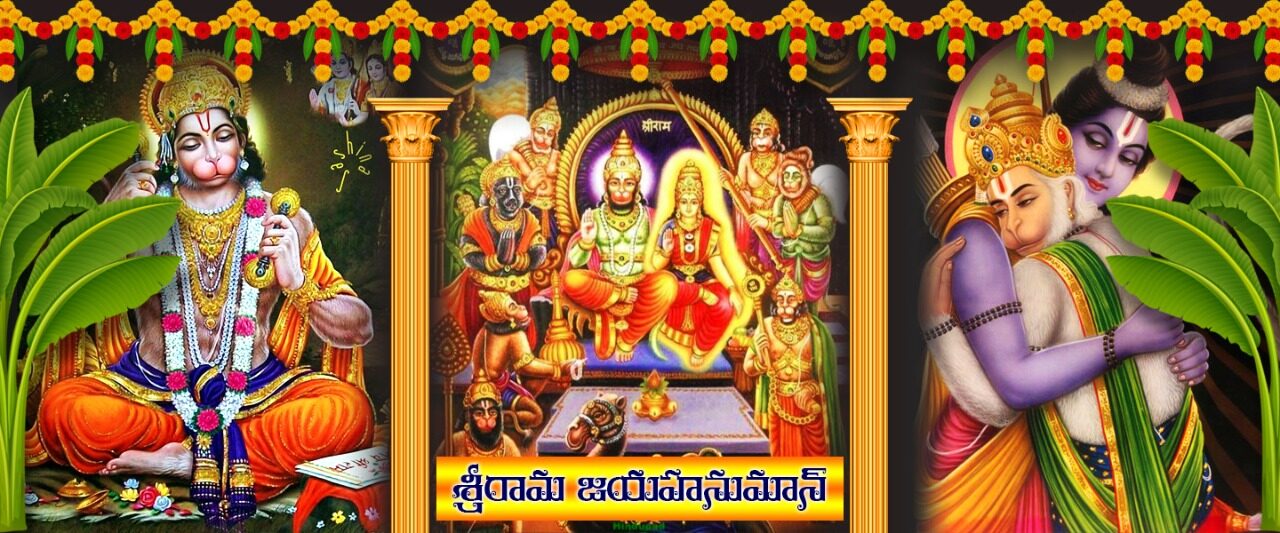



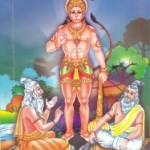

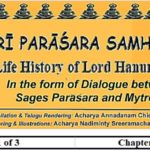
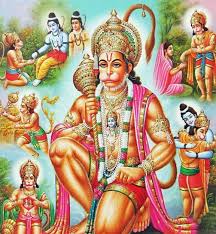
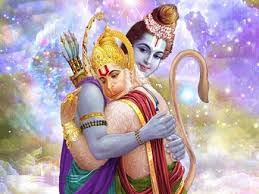
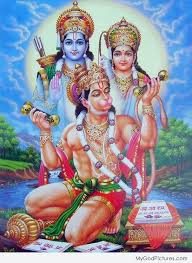
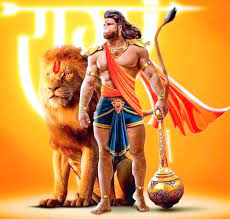
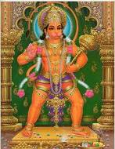
Be First to Comment